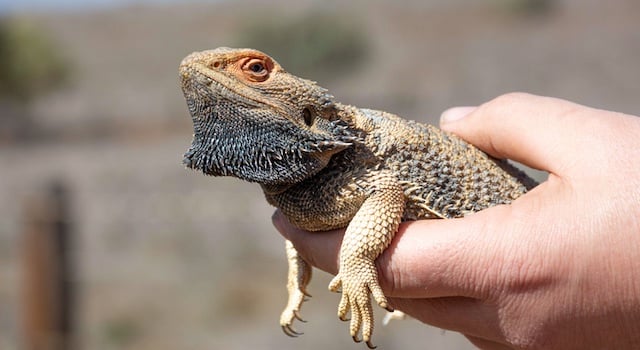
Introduction to Bearded Dragon Black Beards
Have you ever wondered where bearded dragons get their name from? Although they don’t have the typical beard we might think of, they do have a beard of spiky scales under their chin. Their “beards” can puff up and darken depending on their mood or as a form of communication, usually during offensive and defensive behaviors. It’s quite an interesting behavior that can be alarming to see if your bearded dragon hasn’t done it before.
This article will discuss what a bearded dragon’s black beard means and what to do when you see it.
What is a Black Beard in Bearded Dragons?
Many animals have fascinating defense mechanisms they use to seem more intimidating, like dogs and cats who raise the hair on their backs or pufferfish who inflate to appear larger. Bearded dragons are no exception and have black beards that can darken or puff up to make them seem more intimidating. The beard is just specialized scales with a spiky appearance that spreads under the chin and sometimes to the chest. It’s usually the same color as the rest of the body and only darkens when their mood changes.
A bearded dragon’s beard changes color due to chromatophores under their skin expanding and contracting. Chromatophores are cells containing pigments (melanophores, xanthophores, and iridophores) that can change skin color. Melanophores contain dark brown and black pigments that give the beard a dark appearance.
Common Reasons for Bearded Dragon Black Beards
The most common reason a bearded dragon’s beard darkens and puffs up is as a defense mechanism when they feel threatened. It makes them appear larger and more intimidating, which could help ward off threats. Interestingly, a bearded dragon’s beard can darken without being puffed up for reasons such as emotional responses, physical discomfort, or environmental triggers.
- Stress or Fear: Bearded dragons can feel stressed for a number of reasons, like loud noises, new environments, perceived threats, or improper handling. Their beards turn black in response to these intense emotions, which get triggered when the adrenal glands release stress hormones (corticosterone), causing the melanophores to expand and release more melanin.
- Excitement or Display: It is common for their beards to darken during mating season to show dominance to other males or to impress females. Males also undergo hormonal changes that can trigger the release of more melanin.
- Temperature Fluctuations: Temperature issues can be stressful for bearded dragons and cause their beards to turn black. This could be from abnormally hot temperatures or when it gets too chilly for comfort. Although bearded dragons need external warmth because they are cold-blooded, they are still sensitive to basking or ambient temperatures that are too warm and prevent them from cooling down properly.
- Pain or Discomfort: Similar to how we have physical reactions to pain or discomfort when we are sick, like increased heart rate or sweating, bearded dragons do too. A black beard could indicate an injury or health issues such as respiratory distress, metabolic bone disease, or infections.
- Environmental Changes: New surroundings or sudden changes in routine (feeding delays or changes in light schedules) can be stressful for bearded dragons.
How to Determine the Cause
Now that you know the common reasons for a black beard, how do you determine the cause? Observing your bearded dragons’ behavior and surroundings is the best way. If their black beard is puffed up, they are probably acting defensive towards a perceived threat, such as an aggressive cage mate, another pet, or an unfamiliar person.
Changes in appetite, basking habits, and activity levels could indicate potential health or husbandry issues. Check that the temperature and humidity levels are correct and that there haven’t been any recent fluctuations. Has there recently been a change to the usual feeding and light routine? Bearded dragons aren’t fond of changes and can become stressed.
Furthermore, inspect them for signs of illness, such as bloating, discharge, injuries, or labored breathing. Many health issues and injuries can cause discomfort and pain, which can cause their beard to darken.
If you breed bearded dragons or house them with cage mates, the black beard could signify dominance or mating display.
What to Do When Your Bearded Dragon Displays a Black Beard
In most cases, a black beard is not necessarily a cause for concern. It can happen occasionally, and interfering might worsen the situation. However, there are a few situations where it might be necessary to intervene. If it happens when they are outside the enclosure, it’s a good idea to put them back and give them time to calm down. If they are already in the enclosure but environmental disturbances are happening around them, try reducing loud noises, bright lights or taking other pets out of the room.
Black beards are often a sign of stress or other intense emotions, so moving them to a calm environment can be helpful. You should also ensure that the enclosure conditions are ideal and that the temperature and humidity levels are within an ideal range and adjust them if necessary.
If you suspect a health issue could cause the black beard, contact a veterinarian for a health check-up and for further advice on keeping them comfortable at home until the appointment. Any signs of lethargy, weight loss, respiratory distress, or changes in appetite accompanying the black beard could be from health issues.
You generally want to avoid handling your bearded dragon if they have a black beard. Although you might have good intentions and want to comfort them, it’s best to give them space to avoid further stress.
Preventing Black Beard Stress
- Maintain Consistent Care: Bearded dragons need consistent care routines with minimal changes to prevent stress, ensuring the temperature and humidity levels remain stable. You can prevent fluctuations by using a thermostat to control temperatures.
- Proper Husbandry: Ensure your bearded dragon has an ideal enclosure setup with a basking area, cool area, and UVB exposure. The basking area’s temperature should be 107-113°F (42-45°C), and the cool side 77-84°F (25-29°C). Bearded dragons must move between the basking area and the cool side to regulate temperature effectively. Any sudden fluctuations in temperature can be stressful and cause their beard to turn black.
- Monitor Interactions: You generally want to avoid housing multiple bearded dragons together to prevent fighting or dominance disputes between males. They are solitary in the wild and generally do much better living alone. Males should also never be housed with other males to prevent stress, fighting, and serious injuries. Having a single bearded dragon in a spacious enclosure with the correct setup is ideal.
Misconceptions About Black Bearding
1. It’s Not Always a Sign of Illness
A bearded dragon’s beard occasionally turns black in response to their mood. It’s not always a sign of illness or something wrong with them. If it doesn’t happen often and they show no signs of illness or stress, then a black beard isn’t much of a concern. There are many other reasons for their beard to turn black unrelated to illnesses.
2. Not Exclusive to Males
You might be surprised to learn that black bearding is not exclusive to males and happens to females for similar reasons, such as stress or during mating season. It’s just that it tends to happen more often in males, especially during mating season, due to hormonal changes.
Fun Facts About Black Beards
1. It’s An Effective Communication Tool
Body language is a primary form of communication for bearded dragons, and their black beard is a perfect example of this. A black, flared beard is used to communicate with other bearded dragons or perceived threats. It’s a defense mechanism to make them look intimidating when they feel stressed or threatened. Bearded dragons also have other ways to communicate through their body language, such as head bobbing and arm waving.
2. Seasonal Behavior
A male bearded dragon’s beard often turns black during mating season, especially in the wild. They will darken their beards to impress females and to ward off or show dominance to other males. Males often experience a surge in testosterone during mating season, which stimulates the melanophores and causes the beard to darken.
Conclusion
Black bearding is a natural behavior for bearded dragons that can indicate various factors, from stress or health issues to hormones or mating displays. Both males and females can display a black beard, although it is more commonly seen in males. A puffed-up black beard is generally a defense mechanism to intimidate perceived threats.
If your bearded dragon is not showing any signs of illness and their environmental conditions are ideal, then there’s no need to intervene. If your bearded dragon is black bearding often or showing signs of health issues, you should consult with a veterinarian to have them checked out.



